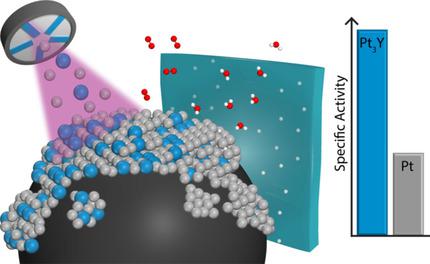Fuel Cell Measurements with Cathode Catalysts of Sputtered Pt3Y Thin Films
Niklas Lindahl; Björn Eriksson; Henrik Grönbeck; Rakel Wreland Lindström; Göran Lindbergh; Carina Lagergren; Björn Wickman
Index: 10.1002/cssc.201800023
Full Text: HTML
Abstract

Fuel cells are foreseen to have an important role in sustainable energy systems, provided that catalysts with higher activity and stability are developed. In this study, highly active sputtered thin films of platinum alloyed with yttrium (Pt3Y) are deposited on commercial gas diffusion layers and their performance in a proton exchange membrane fuel cell is measured. After acid pretreatment, the alloy is found to have up to 2.5 times higher specific activity than pure platinum. The performance of Pt3Y is much higher than that of pure Pt, even if all of the alloying element was leached out from parts of the thin metal film on the porous support. This indicates that an even higher performance is expected if the structure of the Pt3Y catalyst or the support could be further improved. The results show that platinum alloyed with rare earth metals can be used as highly active cathode catalyst materials, and significantly reduce the amount of platinum needed, in real fuel cells.
|
A Stable Plasmonic Cu@Cu2O/ZnO Heterojunction for Enhanced P...
2018-04-16 [10.1002/cssc.201800249] |
|
Internal Polarization Modulation in Bi2MoO6 for Photocatalyt...
2018-04-16 [10.1002/cssc.201800180] |
|
Transglycosylation: A Key Reaction to Access Alkylpolyglycos...
2018-04-16 [10.1002/cssc.201800265] |
|
Simple Cadmium Sulfide Compound with Stable 95 % Selectivity...
2018-04-14 [10.1002/cssc.201800372] |
|
Reactions of Disulfides with Silyl Phosphites to Generate Th...
2018-04-14 [10.1002/cssc.201800236] |